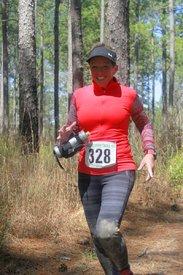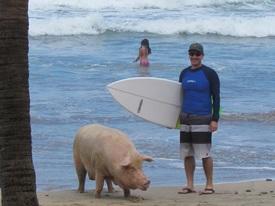What to drink during a run?

RoxBim
Posts: 9 Member
Hi - I'm training for my half marathon. I do short runs (3-5 miles) during the week and my long runs on the weekend. I'm currently drinking zero calorie vitamin water on my short runs and I'm not sure if that's enough. What do others drink out there? I heard once you pass the hour of running mark, you need to start drinking sports drink. Please advise.
0
Replies
-
I drink water on my short runs. If I am running over 6 miles or an hour I also drink a sports drink designed to replace electrolytes. My current favorite is Hammer Nutrition Heed in the melon flavor. Its super yummy.
Vitamin Water 0 has no sodium and no potassium so nothing to offer you if anything in terms the electrolytes you need to rehydrate yourself during long runs. G2 Low calorie or Powerade Zero would be better sports drinks if you are trying to stay low calorie.
The thing is your body also needs energy during long runs. My marathon coaches have instructed us that fueling during long runs should include carbs and calories to replace a portion of what we are burning off while running. Calorie free and low calorie sports drinks might not be adequate fuel for long runs. Are you also taking GU, gels, beans or Bloks in addition to your drink?0 -
You don't need to drink anything. Your body is capable of sustained exercise for hours without the need for additional hydration or electrolyte replacement. As long as you are hydrating throughout the day, every day, you will have no danger of dehydration unless you are running in extreme conditions ( high 90s, high humidity). That being said, if you want to drink when you run, then do so. Water is fine.
ETA:
Electrolyte replacement is a myth. The body balances out the electrolysis in the food/liquid as it passes from the stomach to the duodenum. All food and liquid that pass through the intestines to be absorbed have the same concentration of sodium and other electrolytes because of what is added by the pancreas as it enters the intestines.0 -
Electrolyte replacement is a myth. The body balances out the electrolysis in the food/liquid as it passes from the stomach to the duodenum. All food and liquid that pass through the intestines to be absorbed have the same concentration of sodium and other electrolytes because of what is added by the pancreas as it enters the intestines.
I've never heard this before. I am definately not an expert but this contradicts everything I've been told.
What I have heard is more like this:
More: How to Avoid Dehydration on Race Day
Female runners are at greater risk due to a smaller blood volume and an increased likelihood of being hyper-vigilant about hydration, especially if following a low-sodium diet. Heavy sweaters, beginning marathoners who tend to run slowly (therefore with more opportunities to drink) and endurance junkies running for more than four hours need to be especially careful about this condition.
To protect yourself from the hazards of both over and underdrinking, follow the International Marathon Medical Directors Association (IMMDA) evidence-based simple rule: Drink when thirsty. In other words, drink to stay hydrated--don't overdrink. Consume sports drinks (with at least 110 milligrams of sodium in eight ounces) for runs longer than an hour or when appropriate to avoid low sodium levels.
More: How Much Water Should You Drink?
Myth #4: Female runners don't need sports drinks.
Female runners often shortchange themselves by skipping sports drinks or using them incorrectly. If you run longer than 60 minutes at a moderate pace, you need to drink every 15 to 20 minutes after the one-hour mark. Based on 30-plus years of scientific research, experts continue to recommend sports drinks that supply fluid, carbohydrate and electrolytes over water during longer training efforts and races.
More: Which Fluid Hydrates Beset: Water or Sports Drink?
A well-designed sports drink should contain sugar (carbohydrate) and an ample amount of sodium. Carbs, stored as glycogen, are your body's preferred fuel during exercise, and are the only fuel it can burn during intense or anaerobic efforts, such as sprinting for the finish line.
Your body's glycogen stores are limited, however, so supplementing with a sports drink when you plan to race all-out or push yourself longer than 60 minutes is a real performance booster. Salt is added to improve the absorption of carbs and to help replace the sodium lost through sweat.
Experiment with different sports drink brands to find one that works for you before race day. (Your stomach might not tolerate them all.) If you choose not to consume a sports drink, you still require sodium and supplemental carbohydrate. Carry energy gels (take with water to dilute), and try various electrolyte products such as Nuun tablets to keep up with your sodium needs.
http://www.active.com/women/Articles/4-Common-Hydration-Myths.htm0 -
I have water and sometimes a GU if it is a run over 10 miles or so.0
-
This is an excerpt from the latest research on the myth of dehydration and electrolyte replacement. These myths have been propagated and supported by research funded by beverage companies.
http://runningtimes.com/Article.aspx?ArticleID=26481
I am in the middle of reading the book right now. Noakes cites research going back over 100 years that supports his stance.
ETA: My personal experience agrees with this as well. Just a week ago, I did a 21 mile run with no sports drink, no Gu, and no water. I lost 5.5 pounds during the run. I had no drop off in performance as I ran a negative split, with the last few miles in the low 8:00 per mile range. There is going to be a changing of the guard (it's already underway as the common cry is "drink to thirst" now when not long ago it was "drink as much as you can bear") as this information becomes more available to the public.0 -
This is an excerpt from the latest research on the myth of dehydration and electrolyte replacement. These myths have been propagated and supported by research funded by beverage companies.
http://runningtimes.com/Article.aspx?ArticleID=26481
I am in the middle of reading the book right now. Noakes cites research going back over 100 years that supports his stance.
ETA: My personal experience agrees with this as well. Just a week ago, I did a 21 mile run with no sports drink, no Gu, and no water. I lost 5.5 pounds during the run. I had no drop off in performance as I ran a negative split, with the last few miles in the low 8:00 per mile range. There is going to be a changing of the guard (it's already underway as the common cry is "drink to thirst" now when not long ago it was "drink as much as you can bear") as this information becomes more available to the public.
Interesting! I am going to read the article. Thanks.
I always get thirsty and have gotten dehydrated on runs even while drinking water so I doubt I will be giving up drinking while running anytime soon, but maybe I can stick to plain H2O.0 -
This is an excerpt from the latest research on the myth of dehydration and electrolyte replacement. These myths have been propagated and supported by research funded by beverage companies.
http://runningtimes.com/Article.aspx?ArticleID=26481
I am in the middle of reading the book right now. Noakes cites research going back over 100 years that supports his stance.
ETA: My personal experience agrees with this as well. Just a week ago, I did a 21 mile run with no sports drink, no Gu, and no water. I lost 5.5 pounds during the run. I had no drop off in performance as I ran a negative split, with the last few miles in the low 8:00 per mile range. There is going to be a changing of the guard (it's already underway as the common cry is "drink to thirst" now when not long ago it was "drink as much as you can bear") as this information becomes more available to the public.
Interesting! I am going to read the article. Thanks.
I always get thirsty and have gotten dehydrated on runs even while drinking water so I doubt I will be giving up drinking while running anytime soon, but maybe I can stick to plain H2O.
Everybody gets dehydrated on runs. That's unavoidable. What the research reveals is that the body has a very complex way of handling that dehydration without any dangers to the body or without a decrease in performance. I can't remember how much of that the excerpt goes into. The book has a lot more depth. It's like 600 pages.0 -
Why do guys wear Camelbaks in a 5k, yet I can run a half marathon without little or no water? Easy answer, because they THINK they have to drink.
Same thing at the gym, everyone is on the dreadmill with their jug of water or Gatorade. Again, they think they need it.0 -
This is an excerpt from the latest research on the myth of dehydration and electrolyte replacement. These myths have been propagated and supported by research funded by beverage companies.
No conflict of interest there.
Interestingly runners weren't dying from hyponatremia before the sports drink companies starting pushing their hydration agendas.
Trust your thirst. (and stick to water)0 -
This is an excerpt from the latest research on the myth of dehydration and electrolyte replacement. These myths have been propagated and supported by research funded by beverage companies.
No conflict of interest there.
Interestingly runners weren't dying from hyponatremia before the sports drink companies starting pushing their hydration agendas.
Trust your thirst. (and stick to water)
The book gives statistics on this. It's staggering.0 -
Thanks! I haven't tried GU and I use Bloks once in a while. I appreciate your input, I'm still learning.
 0
0 -
I like having something to drink on anything longer than 6 miles. I don't absolutely NEED it, but when my throat feels dry, I want a drink. Sometimes I just carry seedless grapes and pop them.0
-
I drink H20 and take GUs for my 8 mile + runs. I take GU since i run first thing in the AM and to get my body used to them.
GOOD LUCK!0 -
I'm running my 6th marathon next month and I only drink water. I can't handle Gatorade, Powerade or any other sugary drinks like that on my long runs. For a marathon I do take in some homemade gels along with my water for energy.0
This discussion has been closed.







